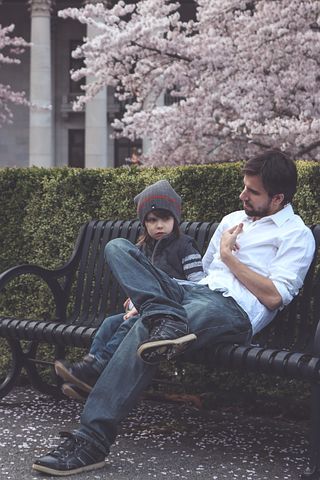Sex
Should Parents Keep Sex Hush-Hush?
The key element for talking about sex with kids.
Posted January 30, 2018
The day that we skip resisting our instincts, we will have learned how to live. —Federico Garcia Lorca

Parents frequently think that talking about sex with their kids is about imparting information about intercourse; the do’s and don’ts. However, kids usually know this stuff—and authoritative repetition is not what inspires behavior. What children need from their parents is guidance concerning the sexuality-related challenges they confront from a trusted relationship. This determines their sexual confidence that they cannot get out of a book or from just anyone.
Therefore, parents need to cast a wide net concerning sexuality by recognizing that they most effectively address sexuality by supporting the formation of their children’s sexual identity, body-self-awareness, and living values in real-time over a dreaded, awkward (often out of context) sex talk.
How we guide our children to develop sexually comes from participating with them in the trenches of their dealing with physical facts, emotional reactions, relational struggles, social expectations, and spiritual values. Guiding their questions over time is what makes the difference, where they feel that they can reveal their vulnerabilities: Am I attractive enough? Is my body okay? Are my breasts too big or too small? Is my penis big enough? How do I manage a bully? Can my faith and values really apply when everyone says to be a real man I have to score when I'm a teenager? Sexuality is formed often indirectly through the events that shape our sexuality.
Right Under Our Noses
This was one of those scary moments that parents dread: My daughter, Ariana, a six-year-old, at the time, lingered at the dinner table after she finished her meal. She then joined the family in the living room. However, when I later passed through the dining room, I noticed something sticking out from under her seat. It appeared to be food that was stuffed under her seat cushion.
So, I asked, “Ariana, what’s that?” pointing toward her chair.
She bowed her head immediately and quickly walking away, stoically withdrawing to her bedroom.
I sat there for a moment feeling puzzled; this was very strange behavior for the youngest of our three. Ariana had always had a healthy appetite and had never been shy about telling us if she didn’t like something or telling us if she felt sick. And, now, where was she off to?
In general, Ariana thrived on accepting the challenge of keeping up with her older brother and sister, who are three and four years older. She was already proving herself to be a serious student and had also carved out competitive gymnastics as her sport at the age of four, distinguishing herself from her big sister, who, since the same age, had competed in figure-skating. Ariana’s natural ability as a gymnast had led her to join an elite club of child gymnasts; and just that week she had performed in her first show with a second-place finish.
I went to her bedroom and asked why she had put her food under her cushion instead of eating it. She stood there, unwilling to look up from the ground, and with intense gravity said, “I don’t know.”
“Did someone hurt you? Did something happen at school?” I asked.
“Not at school…” she answered, without elaborating. So, something quite serious had happened, I thought.
“At the gymnastics meet?”
“Yes.” And then the floodgates opened, as she slowly explained, trembling between her tears, “After the awards, I went to the dressing room with my trophy, and an older girl came up to me and pointed to her tummy. She told me that I’ll ‘never be able to win first place unless my ribs show through my skin. She said, ‘Sucks to be you!’ really loud and walked off.”
Immediately I swooped her up and hugged her. “Why didn’t you tell me about this before?” I asked. “You don’t need to starve yourself to be a winner. And you don’t need to be any other kind of a winner when you’re already the most important kind of winner in the world—because you are the amazing, winning you! I love you, sweetheart!”
When my wife came home later that evening, we talked together with Ariana about what had happened. We wanted to make sure that Ariana realized the danger of not eating enough food, and that she understood that she was perfect the way she was—and didn’t need to change herself for gymnastics. It was an unnerving experience for both my wife and I, because, already, right under our noses, our littlest angel of six years old had been peer-pressured into potentially self-destructive behavior. An older girl had elbowed her way into our daughter’s consciousness and defined a “normalcy” that wasn’t normal at all. In this case, a competitor was influencing Ariana to conform physically, but it was a wake-up call that inevitably sooner or later there would be pressures from her peers to conform in other ways.
The young always have the same problem—How to rebel and conform at the same time. They have now solved this by defying their parents and copying one another.—Quentin Crisp

This incident also reminded me of the cruelty that our children face from other children —the power that peer pressure has to destroy all of the esteem-building that parents seek to strengthen with their children. A child’s sense of adequacy and self-respect can so easily be undone by the ridicule of others. Sometimes (to use their language) it does suck to be them!
So what can we, as parents, do to strengthen our children’s confidence in order to help them manage social pressure—and to integrate a healthy understanding of sexuality into their life? We need to try to put ourselves in our children’s shoes so that we might understand some of what they’re up against. In doing so, maybe we can understand how we can help them to take control of their bodies and their sexuality in the challenging world in which we all live.
Often teens do not have their own voice about their sexuality. Many teenage girls and young women (as well as boys and men) have shared with me in counseling that sex was either expected or necessary in relationships. They have sex as a result of feeling coerced. Establishing an environment where your children talk about their bodies, their social experiences, and their wishes will help them create their sexual voice rather than feeling vulnerable to others and coerced. That's why your relationship with your children is the key element when talking with your kids about sexuality.
The Age of Un-Innocence

Many parents feel helpless concerning their ability to counter the excesses and poor taste of culture and media to which their children are exposed. While the blame game cycles about the quality of messages children receive from home, school, church, and society, sexual activities are on the rise at earlier and earlier ages. In the end, the problem is not about defining details alone of “the bump and grind;” the vacuum occurs regarding the lack of guidance that help children make connections between sex, love, and intimacy.
As you may doubt your adequacy to serve as a guide on the complex topics of sexuality, and your children may squirm at the thought that you will be moving on "the sex talk," the most effective action is to deepen your relationship with your child over time by developing an ongoing exchange on intimacy, sexuality, and love. Let the contents of “the talk” come naturally rather than orchestrating an unusual exchange. Prompts for these conversations surround us from news events, school reports, stories shared at the table, and the real-life experiences of how your family interacts. The task is to bring these discussions of sexuality home through applied and realistic connections for your children. Children seek to identify with their parents and both need and want their support. To make this happen, parents need to express openness and understanding and provide clear direction. When you don’t feel like you have a clear response, make time to figure out answers to the questions with your kids.
Sex is the least comfortable—and thus least discussed—topic between parents and children. Even the most enlightened parent can get queasy at the prospect of "the talk.” But the talk need not be feared. Your quality relationship paves a natural way for effective communications. Our children—from infancy to adulthood—need to know that they can always come to us with questions and concerns. They need to know that we care about them and will come through to help them find answers, even if we are uncertain ourselves. We can teach our children how to make sexuality a safe, healthy, and sacred part of their lives.
Parents today commonly defer their children to participate in sex education. But what occurs when sex education runs counter to your values? Is sex–education value-free? Are the “formal” messages that kids receive simply informative or do the communications direct kids to certain attitudes and sexual behaviors? Are you prepared to square your beliefs and values about sexuality in view of the forces of the culture and school that encompass the largest part of your children's life?
Most studies confirm that talking about sex influences sexual behaviors of children minimally. This means that it’s not so much what you say to them that makes a difference, but it may well be that what kids understand about themselves, their ability to establish meaningful relationships, and what they’ve assimilated about sexuality for their life makes a real difference. Therefore, your effectiveness concerning your guidance about sexuality depends particularly on your relationship to effectively tap into your children's concerns.
We do not even in the least know the final cause of sexuality. The while subject is in darkness. —Charles Darwin
Take Heart

Sexuality is a complex and tough subject, yet, also it is one of the most important and fulfilling parts of life. Your children can become sexually confident with your help.
Here are some tips to assist in the process:
1) Note that your kids, like kids of all ages, have sexual needs and they don’t magically turn into sexual creatures at age 16, 18, or 21. Even if you don’t judge your own sexuality, intimacy, and love as adequately balanced, confronting this topic openly can help you, as well, address your needs as you assist your children with this essential aspect of life.
2) Recognize that you do not have all the answers (sort of just like not feeling on-the-spot, ready to help your high-schooler with calculus) but, all the more, on this vital subject, you need to be in there with them to find out answers. Your talks do not mean that you need to always get the right answers (an impossibility). Keep in mind that even the so-called experts also don’t have your answers either.

3) Bring the subject from the head to the heart. Talking about sex is never about information alone, it’s about attending to individual needs with strategies of bringing the subject from the head to the heart. If you go for information alone, without a living context, you and your child will be missing the essence of the issue.
4) “Flesh out” the whole package concerning connections between sex, intimacy, and love—breaking down physical, emotional, social, relational, and spiritual aspects of sexuality. While sex can be separated out from intimacy and love, the lack of making these connections usually leaves people empty and unfulfilled.
5) Remember that each of us interprets sexuality, intimacy, and love uniquely, and provide guidance based on reason. You do not want to close doors to communication by acting rigid, negatively, and with anxiety. Your openness and understanding will build openness and confidence.
6) Provide factual information regarding sexual needs and behavior. Explain individual differences about sex, love, and intimacy. As your children recognize that your guidance is confidential and authoritative, they will confirm your legitimate authority in their heart and trust your counsel about their most significant concerns. You will deepen your relationship with your children.
7) Know that you communicate through your actions and your behaviors about your true beliefs. Your modeling of relationships is one of the most powerful lessons that you are demonstrating about sex, intimacy, and love. Your life and behavior is one of the most powerful lessons and it’s on display.
All this is to say is that you are your children's best mentor and instructor through the relationship you shape with your children. Addressing sexuality is one of the most vital responsibilities and opportunities of parenting and is best demonstrated by the quality of trust and care in the relationship that you have established.
John T. Chirban, Ph.D., Th.D., is a lecturer at Harvard Medical School, part-time, and author of How to Talk With Your Kids About Sex, and recently published Collateral Damage: Guiding and Protecting Your Child Through the Minefield of Divorce (HarperCollins, 2017). For more information visit drchirban.com.




